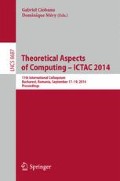Abstract
Verification of concurrent systems is difficult because of the inherent nondeterminism. Modern verification requires better locality and modularity. Reasoning of shared memory systems has gained much progress in these aspects. However, modular verification of distributed systems is still in demand. In this paper, we propose a new reasoning system for message-passing programs. It is a novel logic that supports Hoare style triples to specify and verify distributed programs modularly. We concretize the concept of event traces to represent interactions among distributed agents, and specify behaviors of agents by their local traces with regard to environmental assumptions. Based on trace semantics, the verification is compositional in both temporal and spatial dimensions. As an example, we show how to modularly verify an implementation of merging network.
Supported by NNSF of China, Grant No. 61272160, 61100061, and 61202069.
Access this chapter
Tax calculation will be finalised at checkout
Purchases are for personal use only
Preview
Unable to display preview. Download preview PDF.
References
Bickford, M., Constable, R.L.: A causal logic of events in formalized computational type theory (2005)
Brookes, S.D.: A semantics for concurrent separation logic. In: Gardner, P., Yoshida, N. (eds.) CONCUR 2004. LNCS, vol. 3170, pp. 16–34. Springer, Heidelberg (2004)
Charron-Bost, B., Mattern, F., Tel, G.: Synchronous, asynchronous, and causally ordered communication. Distributed Computing 9(4), 173–191 (1996)
de Roever, W.-P., de Boer, F., Hanneman, U., Hooman, J., Lakhnech, Y., Poel, M., Zwiers, J.: Concurrency Verification: Introduction to Compositional and Noncompositional Proof Methods. Cambridge University Press (January 2012)
Hoare, C.A.R.: Communicating sequential processes. Commun. ACM 21(8), 666–677 (1978)
Jones, C.B.: Tentative steps toward a development method for interfering programs. ACM Trans. Program. Lang. Syst. 5(4), 596–619 (1983)
Kahn, G.: The semantics of simple language for parallel programming. In: IFIP Congress, pp. 471–475 (1974)
Lamport, L.: Time, clocks, and the ordering of events in a distributed system. Commun. ACM 21(7), 558–565 (1978)
Lei, J., Qiu, Z.: Modular reasoning for message-passing programs. Technical report, School of Mathematical Sciences, Peking University (June 2014), https://sites.google.com/site/jinjianglei/publications/rgdsep.
Milner, R.: A Calculus of Communication Systems. LNCS, vol. 92. Springer, Heidelberg (1980)
Milner, R.: Communication and concurrency. PHI Series in computer science. Prentice Hall (1989)
Milner, R.: The polyadic pi-calculus (abstract). In: Cleaveland, W.R. (ed.) CONCUR 1992. LNCS, vol. 630, p. 1. Springer, Heidelberg (1992)
Milner, R.: Communicating and mobile systems - the Pi-calculus. Cambridge University Press (1999)
Parkinson, M.J., Bornat, R., Calcagno, C.: Variables as resource in hoare logics. In: LICS, pp. 137–146 (2006)
Reddy, U.S., Reynolds, J.C.: Syntactic control of interference for separation logic. In: POPL, pp. 323–336 (2012)
Reynolds, J.C.: Separation logic: A logic for shared mutable data structures. In: LICS, pp. 55–74 (2002)
Vafeiadis, V., Parkinson, M.J.: A marriage of rely/guarantee and separation logic. In: Caires, L., Vasconcelos, V.T. (eds.) CONCUR 2007. LNCS, vol. 4703, pp. 256–271. Springer, Heidelberg (2007)
Villard, J., Lozes, É., Calcagno, C.: Proving copyless message passing. In: Hu, Z. (ed.) APLAS 2009. LNCS, vol. 5904, pp. 194–209. Springer, Heidelberg (2009)
Wehrman, I., Hoare, C.A.R., O’Hearn, P.W.: Graphical models of separation logic. Inf. Process. Lett. 109(17), 1001–1004 (2009)
Author information
Authors and Affiliations
Editor information
Editors and Affiliations
Rights and permissions
Copyright information
© 2014 Springer International Publishing Switzerland
About this paper
Cite this paper
Lei, J., Qiu, Z. (2014). Modular Reasoning for Message-Passing Programs. In: Ciobanu, G., Méry, D. (eds) Theoretical Aspects of Computing – ICTAC 2014. ICTAC 2014. Lecture Notes in Computer Science, vol 8687. Springer, Cham. https://doi.org/10.1007/978-3-319-10882-7_17
Download citation
DOI: https://doi.org/10.1007/978-3-319-10882-7_17
Publisher Name: Springer, Cham
Print ISBN: 978-3-319-10881-0
Online ISBN: 978-3-319-10882-7
eBook Packages: Computer ScienceComputer Science (R0)

